-
 Bitcoin
Bitcoin $84,437.5835
0.52% -
 Ethereum
Ethereum $1,595.7301
0.81% -
 Tether USDt
Tether USDt $0.9996
-0.03% -
 XRP
XRP $2.0966
0.71% -
 BNB
BNB $585.8443
1.09% -
 Solana
Solana $133.3956
5.93% -
 USDC
USDC $0.9997
-0.04% -
 TRON
TRON $0.2469
-2.88% -
 Dogecoin
Dogecoin $0.1563
1.92% -
 Cardano
Cardano $0.6164
1.64% -
 UNUS SED LEO
UNUS SED LEO $9.4393
0.44% -
 Chainlink
Chainlink $12.4519
2.06% -
 Avalanche
Avalanche $19.2827
2.05% -
 Toncoin
Toncoin $2.9578
3.42% -
 Stellar
Stellar $0.2370
0.71% -
 Shiba Inu
Shiba Inu $0.0...01190
2.27% -
 Sui
Sui $2.0992
0.55% -
 Hedera
Hedera $0.1595
1.04% -
 Bitcoin Cash
Bitcoin Cash $333.1464
3.75% -
 Polkadot
Polkadot $3.6476
3.53% -
 Litecoin
Litecoin $74.9463
-0.39% -
 Hyperliquid
Hyperliquid $16.4813
8.05% -
 Dai
Dai $0.9999
-0.01% -
 Bitget Token
Bitget Token $4.3661
0.98% -
 Ethena USDe
Ethena USDe $0.9990
-0.03% -
 Pi
Pi $0.6051
-2.37% -
 Monero
Monero $217.2967
-0.90% -
 Uniswap
Uniswap $5.2082
0.84% -
 OKB
OKB $51.2380
-1.86% -
 Pepe
Pepe $0.0...07271
2.15%
What is a Rollup and its expansion principle?
Rollups enhance blockchain scalability by processing transactions off-chain, reducing congestion and fees; optimistic rollups use fraud proofs, while ZK-rollups use validity proofs.
Apr 08, 2025 at 10:56 pm
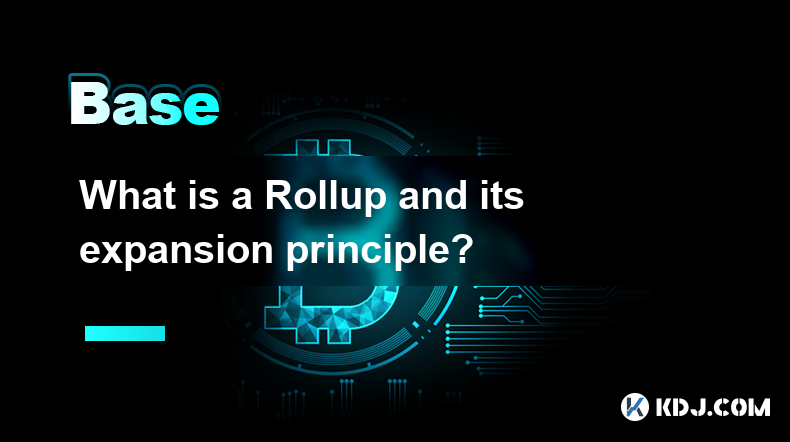
A rollup is a layer 2 scaling solution designed to enhance the efficiency and scalability of blockchain networks, particularly Ethereum. The primary goal of rollups is to process transactions off the main blockchain, thereby reducing congestion and lowering transaction fees. There are two main types of rollups: Optimistic Rollups and Zero-Knowledge Rollups (ZK-Rollups). Each type operates on different principles but shares the common objective of improving blockchain performance.
What is an Optimistic Rollup?
Optimistic Rollups operate under the assumption that transactions are valid by default. This approach allows for immediate transaction processing off-chain, with the data being periodically submitted to the main blockchain. The key feature of optimistic rollups is the use of a fraud proof mechanism. If a transaction is disputed, anyone can submit a fraud proof to challenge the transaction's validity. This process triggers a dispute resolution period, during which the transaction is re-evaluated on the main chain.
The expansion principle of optimistic rollups involves batching multiple transactions into a single transaction on the main blockchain. This batching reduces the amount of data that needs to be stored on the main chain, thereby increasing throughput and reducing costs. The process can be broken down into several steps:
- Transaction Submission: Users submit their transactions to the rollup's off-chain environment.
- Transaction Batching: The rollup aggregates multiple transactions into a single batch.
- Batch Submission: The batch is submitted to the main blockchain as a single transaction.
- Fraud Proof Period: A period during which anyone can challenge the validity of the transactions in the batch.
- Finalization: If no fraud proofs are submitted, the transactions are considered final and valid.
What is a Zero-Knowledge Rollup?
Zero-Knowledge Rollups (ZK-Rollups) use cryptographic proofs, specifically zero-knowledge proofs, to validate transactions off-chain before submitting them to the main blockchain. Unlike optimistic rollups, ZK-Rollups do not rely on a fraud proof mechanism. Instead, they use validity proofs to ensure that all transactions in a batch are valid before they are committed to the main chain.
The expansion principle of ZK-Rollups involves the following steps:
- Transaction Submission: Users submit their transactions to the ZK-Rollup's off-chain environment.
- Transaction Processing: The rollup processes these transactions and generates a zero-knowledge proof for the entire batch.
- Proof Submission: The zero-knowledge proof, along with the transaction data, is submitted to the main blockchain.
- Verification: The main blockchain verifies the zero-knowledge proof to ensure the validity of the transactions.
- Finalization: Once verified, the transactions are considered final and valid.
How Do Rollups Enhance Blockchain Scalability?
Rollups enhance blockchain scalability by moving the bulk of transaction processing off the main chain. This off-chain processing reduces the load on the main blockchain, allowing it to handle more transactions per second. By batching multiple transactions into a single on-chain transaction, rollups significantly reduce the amount of data that needs to be stored on the main chain, which in turn lowers transaction fees and increases throughput.
What Are the Key Differences Between Optimistic and Zero-Knowledge Rollups?
The key differences between Optimistic Rollups and Zero-Knowledge Rollups lie in their validation mechanisms and security models. Optimistic Rollups assume transactions are valid by default and use a fraud proof mechanism to challenge invalid transactions. This approach can lead to longer transaction finalization times due to the dispute resolution period. In contrast, Zero-Knowledge Rollups use validity proofs to ensure transaction validity before submission, resulting in faster transaction finality but requiring more computational resources to generate the proofs.
How Are Rollups Implemented in Practice?
In practice, rollups are implemented through a combination of smart contracts on the main blockchain and off-chain infrastructure. For Optimistic Rollups, the off-chain infrastructure includes a sequencer that batches transactions and a dispute resolution system. For Zero-Knowledge Rollups, the off-chain infrastructure includes a prover that generates zero-knowledge proofs and a verifier that checks these proofs on the main chain.
To implement an optimistic rollup, the following steps are typically followed:
- Deploy Smart Contracts: Deploy the necessary smart contracts on the main blockchain to manage the rollup's operations.
- Set Up Off-Chain Infrastructure: Establish the off-chain environment, including the sequencer and dispute resolution system.
- User Interaction: Users interact with the rollup through a user interface, submitting transactions to the off-chain environment.
- Batch Processing: The sequencer batches transactions and submits them to the main blockchain.
- Dispute Resolution: Monitor the fraud proof period and handle any disputes that arise.
For Zero-Knowledge Rollups, the implementation process includes:
- Deploy Smart Contracts: Deploy the necessary smart contracts on the main blockchain to manage the rollup's operations.
- Set Up Off-Chain Infrastructure: Establish the off-chain environment, including the prover and verifier.
- User Interaction: Users interact with the rollup through a user interface, submitting transactions to the off-chain environment.
- Proof Generation: The prover generates zero-knowledge proofs for the batched transactions.
- Proof Submission and Verification: Submit the proofs to the main blockchain, where they are verified and the transactions are finalized.
What Are the Benefits and Challenges of Rollups?
Rollups offer several benefits, including increased transaction throughput, lower transaction fees, and improved scalability. By processing transactions off-chain, rollups can handle a higher volume of transactions without overloading the main blockchain. However, they also face challenges such as complexity in implementation, potential security risks, and the need for additional infrastructure.
For optimistic rollups, the main challenge is the fraud proof mechanism, which can lead to longer transaction finalization times. For ZK-Rollups, the challenge lies in the computational complexity of generating zero-knowledge proofs, which can be resource-intensive.
Frequently Asked Questions
Q: Can rollups be used with any blockchain, or are they specific to Ethereum?
A: While rollups were initially developed for Ethereum, the concept can be applied to other blockchains. However, the implementation details may vary depending on the specific blockchain's architecture and capabilities.
Q: How do rollups affect the security of the main blockchain?
A: Rollups do not compromise the security of the main blockchain. Both optimistic and ZK-Rollups rely on the main chain for final transaction validation, ensuring that the security guarantees of the main blockchain are maintained.
Q: Are there any privacy benefits to using ZK-Rollups?
A: Yes, ZK-Rollups can offer privacy benefits because the zero-knowledge proofs do not reveal the details of the transactions being processed. This can enhance user privacy compared to traditional on-chain transactions.
Q: What is the role of the sequencer in optimistic rollups?
A: The sequencer in optimistic rollups is responsible for batching transactions and submitting them to the main blockchain. It plays a crucial role in ensuring the efficient operation of the rollup and managing the transaction flow.
Disclaimer:info@kdj.com
The information provided is not trading advice. kdj.com does not assume any responsibility for any investments made based on the information provided in this article. Cryptocurrencies are highly volatile and it is highly recommended that you invest with caution after thorough research!
If you believe that the content used on this website infringes your copyright, please contact us immediately (info@kdj.com) and we will delete it promptly.
- Mutuum Finance (MUTM) Demonstrates Rapid Growth
- 2025-04-17 19:15:12
- PEPE (slang for "people eating potatoes")
- 2025-04-17 19:15:12
- Panama City to accept cryptocurrency payments for taxes and municipal fees
- 2025-04-17 19:10:16
- Pi Network (PI) token price plunges 17% as broader cryptocurrency market faces instability
- 2025-04-17 19:10:16
- Cardano (ADA) Price Prediction: Could It Reach Its All-Time High of $3?
- 2025-04-17 19:10:14
- Tariffs have recently been the topic of both significant policy recommendations and casual conversations.
- 2025-04-17 19:10:14
Related knowledge

Analysis of the KYC process of cryptocurrency exchanges
Apr 17,2025 at 05:07pm
The Know Your Customer (KYC) process is a critical component in the operations of cryptocurrency exchanges. It serves as a regulatory measure to prevent fraud, money laundering, and other illicit activities. KYC procedures are designed to verify the identity of users and ensure compliance with financial regulations. This article delves into the various ...

What does Floor Price mean in the NFT market
Apr 17,2025 at 12:42am
The term Floor Price is a critical concept within the NFT (Non-Fungible Token) market, serving as a key indicator for both buyers and sellers. In essence, the floor price represents the lowest price at which an NFT from a particular collection is currently listed for sale on a marketplace. This price point is crucial for understanding the perceived valu...
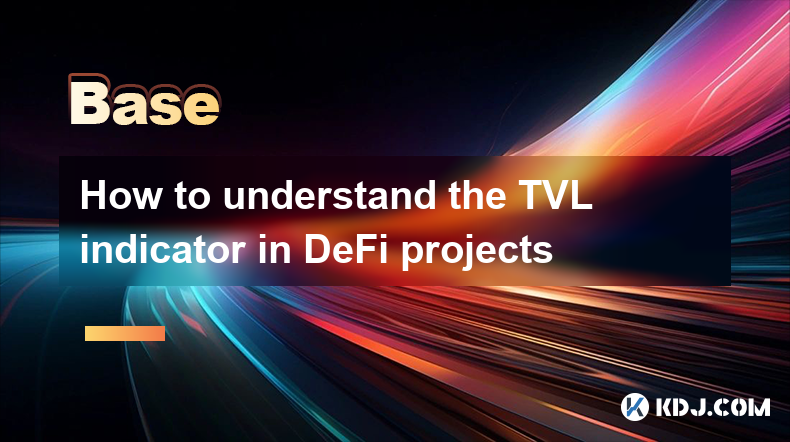
How to understand the TVL indicator in DeFi projects
Apr 17,2025 at 03:28pm
Understanding the TVL indicator in DeFi projects is crucial for investors and enthusiasts looking to gauge the health and popularity of decentralized finance platforms. TVL, or Total Value Locked, represents the total amount of assets that are currently staked or locked in a DeFi protocol. This metric serves as a barometer for the trust and interest tha...
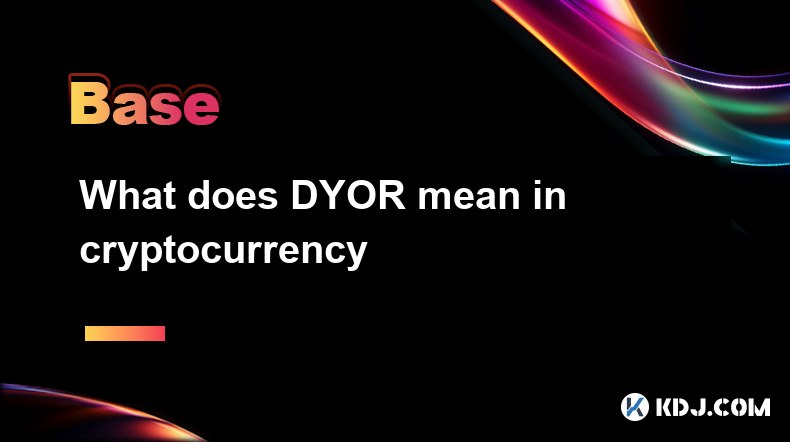
What does DYOR mean in cryptocurrency
Apr 17,2025 at 03:00pm
DYOR, or 'Do Your Own Research,' is a crucial mantra in the cryptocurrency community. It emphasizes the importance of individuals conducting their own thorough investigations before making any investment decisions. In the fast-paced and often volatile world of cryptocurrencies, relying solely on others' advice or the hype surrounding a particular coin c...
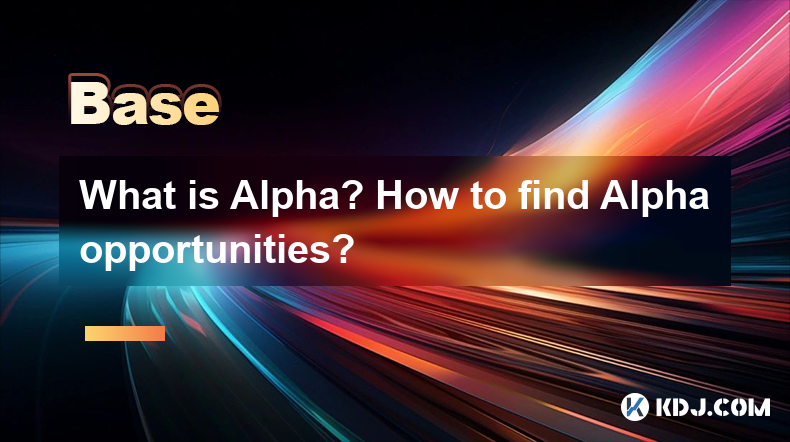
What is Alpha? How to find Alpha opportunities?
Apr 16,2025 at 12:42pm
What is Alpha?Alpha is a term widely used in the financial world, including the cryptocurrency market, to describe the ability of an investment to outperform a benchmark. In the context of cryptocurrencies, alpha refers to the excess return an investor achieves over the market's average return. For example, if the overall crypto market grows by 10% in a...
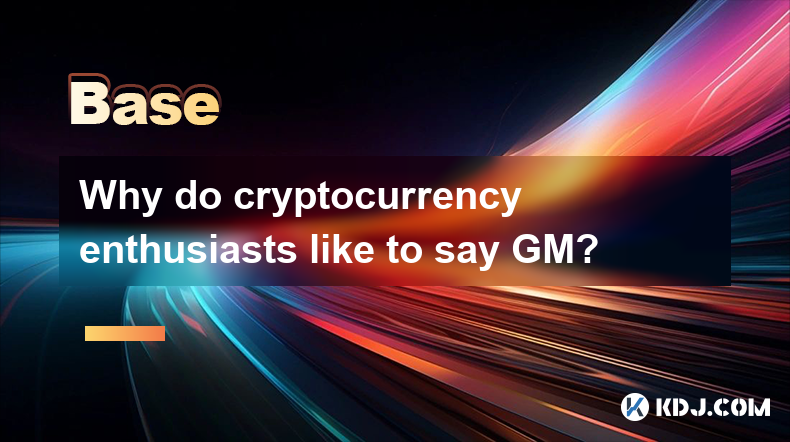
Why do cryptocurrency enthusiasts like to say GM?
Apr 16,2025 at 06:21am
In the world of cryptocurrency, the term 'GM' has become a popular greeting among enthusiasts. GM stands for 'Good Morning,' and its widespread use within the crypto community has a deeper significance than just a simple greeting. This article delves into the reasons why cryptocurrency enthusiasts like to say GM, exploring its origins, cultural signific...

Analysis of the KYC process of cryptocurrency exchanges
Apr 17,2025 at 05:07pm
The Know Your Customer (KYC) process is a critical component in the operations of cryptocurrency exchanges. It serves as a regulatory measure to prevent fraud, money laundering, and other illicit activities. KYC procedures are designed to verify the identity of users and ensure compliance with financial regulations. This article delves into the various ...

What does Floor Price mean in the NFT market
Apr 17,2025 at 12:42am
The term Floor Price is a critical concept within the NFT (Non-Fungible Token) market, serving as a key indicator for both buyers and sellers. In essence, the floor price represents the lowest price at which an NFT from a particular collection is currently listed for sale on a marketplace. This price point is crucial for understanding the perceived valu...

How to understand the TVL indicator in DeFi projects
Apr 17,2025 at 03:28pm
Understanding the TVL indicator in DeFi projects is crucial for investors and enthusiasts looking to gauge the health and popularity of decentralized finance platforms. TVL, or Total Value Locked, represents the total amount of assets that are currently staked or locked in a DeFi protocol. This metric serves as a barometer for the trust and interest tha...

What does DYOR mean in cryptocurrency
Apr 17,2025 at 03:00pm
DYOR, or 'Do Your Own Research,' is a crucial mantra in the cryptocurrency community. It emphasizes the importance of individuals conducting their own thorough investigations before making any investment decisions. In the fast-paced and often volatile world of cryptocurrencies, relying solely on others' advice or the hype surrounding a particular coin c...

What is Alpha? How to find Alpha opportunities?
Apr 16,2025 at 12:42pm
What is Alpha?Alpha is a term widely used in the financial world, including the cryptocurrency market, to describe the ability of an investment to outperform a benchmark. In the context of cryptocurrencies, alpha refers to the excess return an investor achieves over the market's average return. For example, if the overall crypto market grows by 10% in a...

Why do cryptocurrency enthusiasts like to say GM?
Apr 16,2025 at 06:21am
In the world of cryptocurrency, the term 'GM' has become a popular greeting among enthusiasts. GM stands for 'Good Morning,' and its widespread use within the crypto community has a deeper significance than just a simple greeting. This article delves into the reasons why cryptocurrency enthusiasts like to say GM, exploring its origins, cultural signific...
See all articles























































































